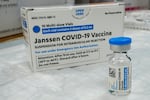Oregon has paused its use of the Johnson & Johnson COVID-19 vaccine while federal officials investigate a possible link to rare, severe blood clots.
The pause follows reports of six cases in the United States of an unusual type of blood clot, cerebral venous sinus thrombosis, in women ages 18-48. One of the cases was fatal. About 6.8 million doses of Johnson & Johnson vaccine have been administered nationally to date, including more than 81,000 in Oregon.
1.) I got the Johnson & Johnson vaccine. Am I at risk?
Possibly — but the risk is very, very low.
“This complication appears to be really rare, on the order of one in a million,” said Dr. Jennifer Vines, health officer for Multnomah County.
In the six “adverse event” cases reported to date in the United States, symptoms have appeared within six to 13 days after the person received the Johnson & Johnson shot.
“If you’re more than three weeks out from your Johnson & Johnson dose, you shouldn’t need to worry,” Vines said.
People who received the shot more recently should be on the lookout for signs of a blood clot: Severe headache, pain in your leg or your belly, or sudden trouble breathing.
People with those symptoms should connect with their healthcare provider immediately or go to the emergency department.

FILE - In this Thursday, April 8, 2021 file photo, the Johnson & Johnson COVID-19 vaccine sits on a table at a pop up vaccinations site the Albanian Islamic Cultural Center, in the Staten Island borough of New York. The U.S. is recommending a “pause” in administration of the single-dose Johnson & Johnson COVID-19 vaccine to investigate reports of potentially dangerous blood clots.
Mary Altaffer / AP
2.) What’s the point of the pause?
Pausing vaccinations gives the CDC and FDA time to gather more information and investigate whether there’s a cause and effect relationship between vaccination and the rare clots, and to evaluate the extent of the risk versus the benefit of vaccination.
Dr. Vines says the public health system has promised to be transparent about any problems with the vaccines and this is an example of that transparency.
“We’re trying to quantify and understand those potential problems so that people can make an informed choice,” Vines said.
The pause also gives public health officials more time to prepare doctors and other health providers who might need to recognize and treat patients with the unusual clots, which occur in combination with low platelet counts. One of the typical anticoagulants used to treat clots, Heparin, shouldn’t be used in these cases.
3.) What happens next?
The CDC’s Advisory Committee on Immunization Practices will meet Wednesday to review information about the cases and to vote on updated recommendations for use of the vaccine. You can watch the meeting via a livestream.
In the meantime, 213,000 doses of the Johnson & Johnson vaccine that have been delivered to clinics and sites statewide will go unused, says Dr. Paul Cieslak, senior health advisor with the Oregon Health Authority.
Many county public health departments and vaccinators say they may be able to offer the Pfizer or Moderna vaccine instead for people who have appointments booked already. But there are likely not enough doses of those shots statewide to fully cover the J&J shortfall.
“Some of the people are going to have to wait a little bit longer to get their vaccinations, unfortunately,” Cieslak said.
4.) You’ve been telling us COVID-19 vaccines are safe. I want to believe you but this makes me nervous.
That’s fair. Don’t panic. Cieslak and Vines want Oregonians to understand two things about the situation.
First, vaccines are held to a higher standard of review than other drugs, because they’re given to otherwise healthy individuals.
From their perspective, the pause is an example of how the nation’s early warning system that monitors vaccine safety is supposed to work.
“These are extraordinary systems in place to find very rare side effects from vaccines. They were in place and found this one-in-a-million side effect that bears looking into,” Cieslak said.
And second, the other approved COVID-19 vaccines from Pfizer and Moderna are mRNA vaccines that use a different pathway to generate immunity to COVID-19.
There are rare cases of allergic reactions to those shots, but they have not been connected to any cases of the severe blood clots.
“We have no reason to think the Pfizer and Moderna vaccines are having a similar problem and we know they’re incredibly effective at preventing a disease that has killed a lot of people,” Cieslak said.
